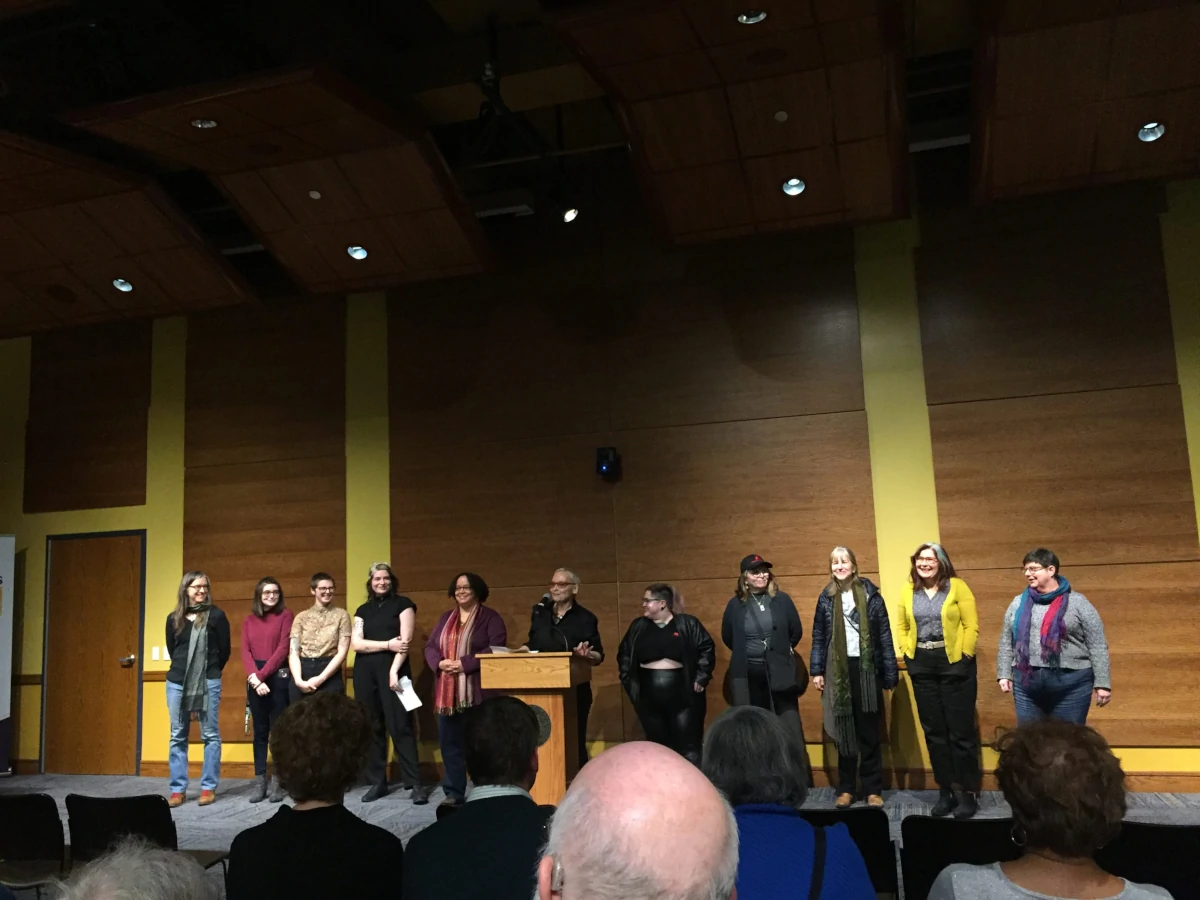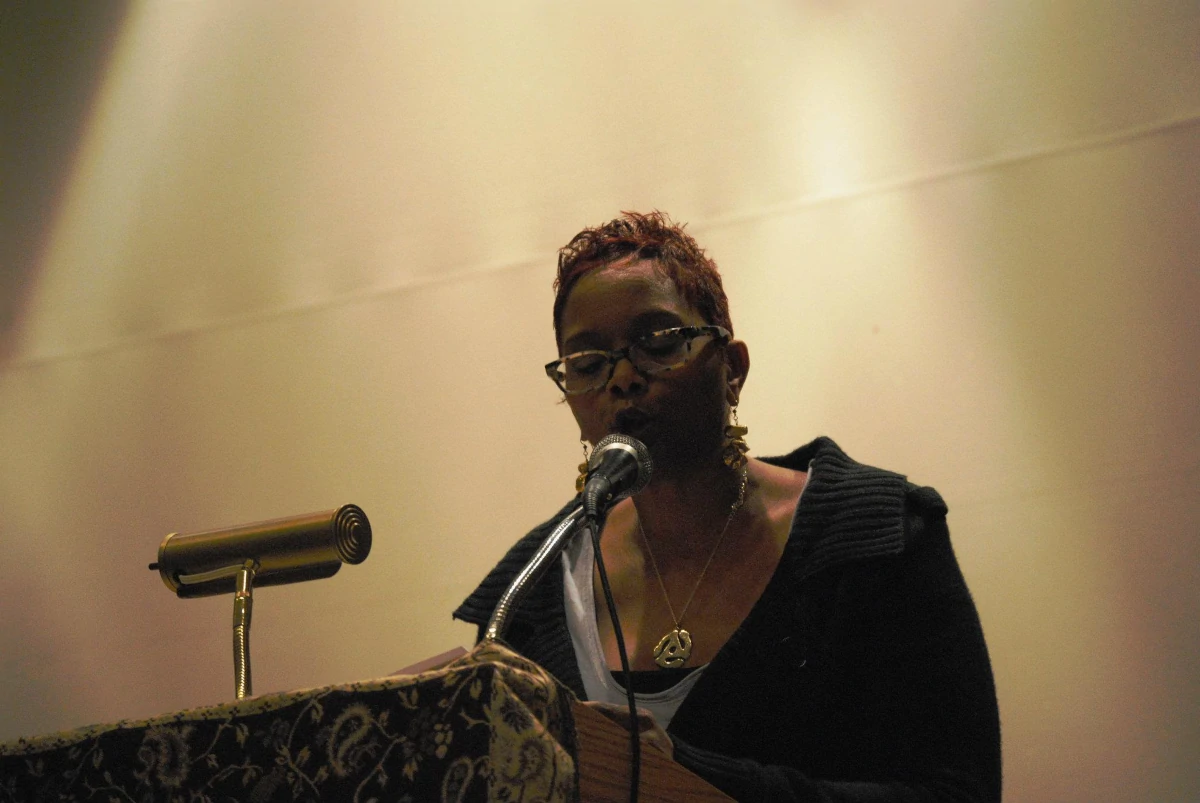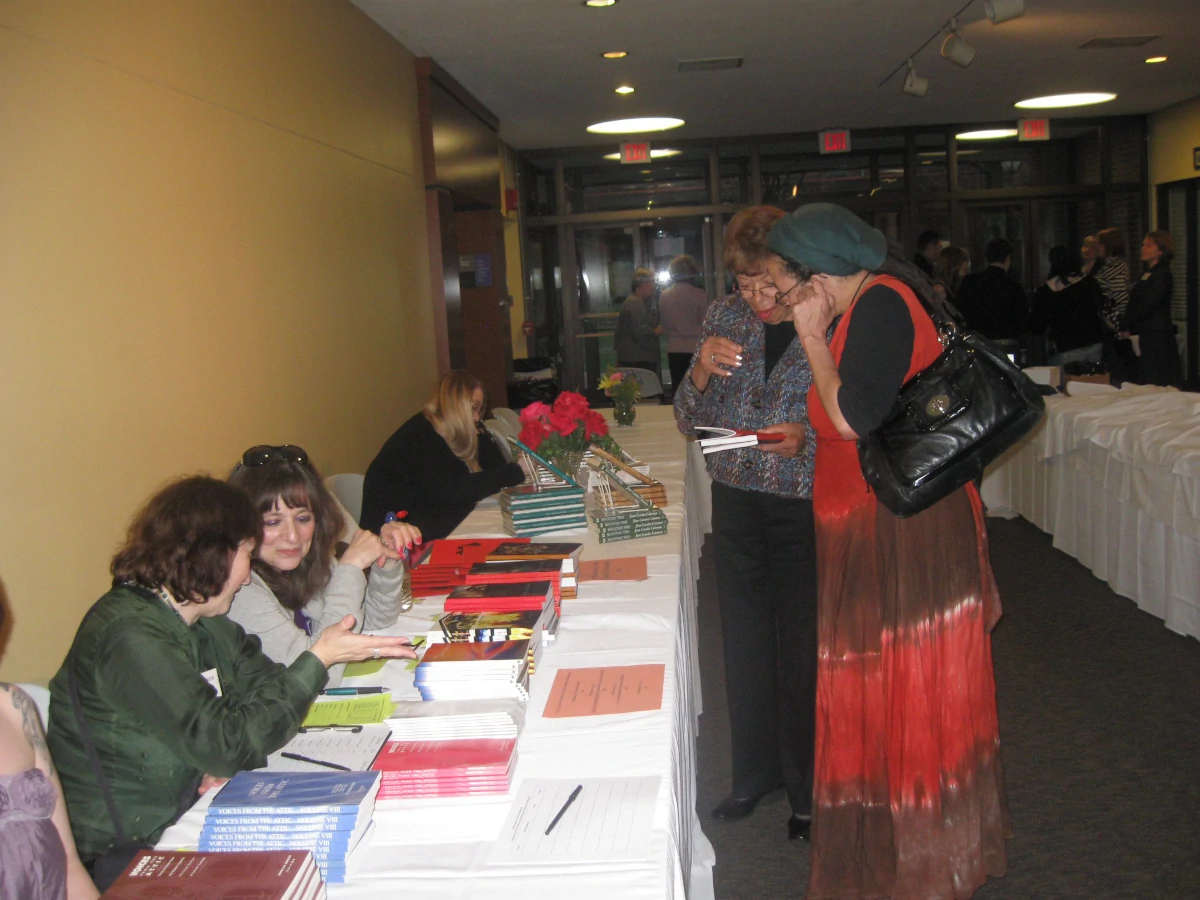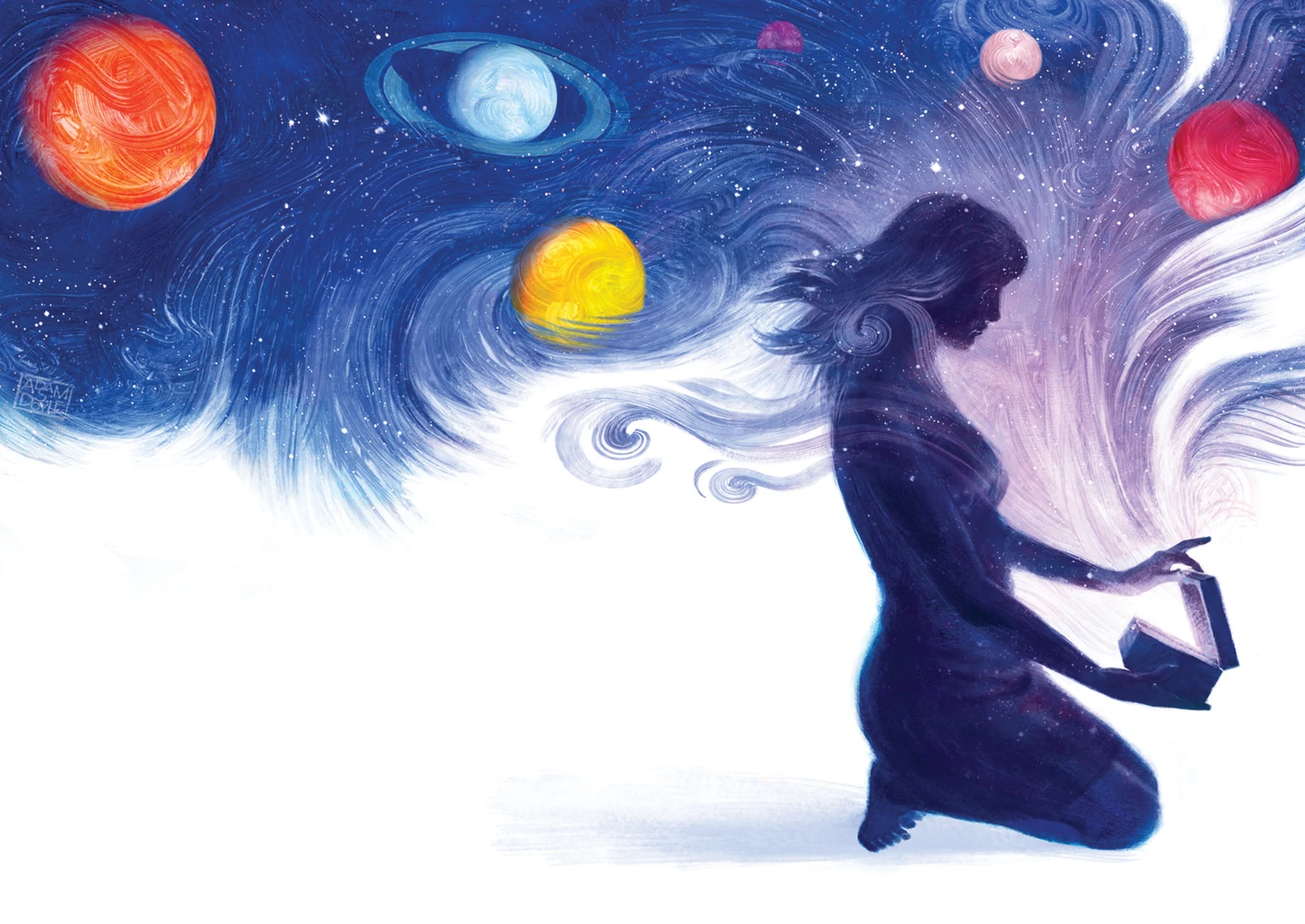Kitchen Table MFA: An Interview With Madwomen
This interview is part of the Kitchen Table MFA, a series that showcases writing communities through interviews and creative writing.
After the interview, be sure to check out the work of Madwomen members Sarah Williams-Devereux, Tess Barry, and Kayla Sargeson. Also, read Nancy’s essay on the Kitchen Table MFA series here.
Madwomen in the Attic writing workshops bring together undergraduates at Carlow University and community members from across Pittsburgh. (They have over 350 members from across the country, and Madwomen who have driven from Maryland and West Virginia to attend classes.) They also have a West Virginia Madwomen chapter, taught by Lori Wilson. They’re remarkably diverse in age (Madwomen range from their early 20s to late 90s!) and life experience, including writers with MFAs and women taking their first writing class. Workshops include fiction, poetry, and nonfiction, and are taught by experienced working writers such as Jan Beatty (who also directs the Madwomen), Tess Barry, Keely Bowers, Joy Katz, Nancy Kirkwood, Nancy Krygowski, Jane McCafferty, Evelyn Pierce, Anne Rashid, Ellen McGrath Smith, Michelle Stoner, Sarah Williams-Devereux, and Lori Wilson.
The Madwomen are an institution in the Pittsburgh writing community. The organization has been running workshops since 1979, and it’s a central hub of connection for writers across the city. Moving to a new city and finding writing community can be so hard, and I know at least two writers for whom Madwomen was a central conduit for building community after they moved to Pittsburgh.
Beyond the workshops, the Madwomen are a force in the Pittsburgh literary scene. They run a monthly reading series, MadFridays (currently run by Lisa Alexander and Kara Knickerbocker) and their facebook group is busy with all kinds of other events. When Madwomen Emily Mohn-Slate and Jennifer Jackson Berry held a launch party for their chapbooks, both winners of the Keystone Chapbook Prize from Seven Kitchens Press, at White Whale Bookstore last spring, the store was jam-packed with a joyous group of writers, many of them fellow Madwomen, eager to celebrate Emily and Jennifer’s work.
The Madwomen run a Mentorship Program, currently directed by Madwomen Liaison Kayla Sargeson, and Lisa Alexander, in which more experienced Madwomen work with newer Madwomen on their writing. The Madwomen Reading Series brings in writers of national acclaim, such as Alicia Ostriker, Patricia Smith, and in 2020—Denise Duhamel. They also feature a series called Writers on Writing, in which writers talk about an element of craft and their writing life. All readings are free and open to the public. Every year, a juried anthology of the Madwomen’s work is published as Voices from the Attic. This year, Vol.XXV was compiled by many Madwomen, including undergraduates, interns, Madwomen teachers Nancy Kirkwood and Jane McCafferty, Senior Editor Jan Beatty, and Managing Editor Sarah Williams-Devereux, who is also the Administrative Assistant to the Madwomen.
Nancy Reddy (NR)
One of the things that’s unique about the Madwomen is how the workshops bring together undergraduates and community members. So many community writing programs housed within universities position the university as a distributor of writing expertise into a community – but the Madwomen put those groups next to each other in a workshop. How did this model develop?
Jan Beatty (JB)
When the feminist writer Tillie Olsen visited Carlow’s campus in the 1970’s, the story is that there was a throng of women following her up the driveway at Carlow after her reading. It became clear that there was a hunger and a need for a writing workshop for women. Ellie Wymard started the Madwomen at that time, and then the beloved writer Patricia Dobler grew the Madwomen into a workshop that included community and university writers. I went on to develop the Madwomen program into eleven sections of poetry, fiction, and nonfiction that include undergraduates from Carlow and other universities. As time progressed, so did the work to build bridges between the undergraduate writing program, the MFA program, the Madwomen, and the university and community.

NR
In addition to helping writers develop craft and build community through workshops, the Madwomen also provide several opportunities for writers to share their work through readings (MadFridays, held on the second Friday of each month) and publication, including Voices in the Attic, a juried anthology of the work of the Madwomen, and a small press, MadBooks, that publishes books and chapbooks. The Madwomen also sponsor the Patricia Dobler Poetry Award, a national prize for a woman poet over forty who has not yet published a book. How have these different components of the organization evolved? Why work on publication as well as workshops?
JB
These components of the organization have evolved as the Madwomen have grown in size, experience, and ferocity. There are some Madwomen who have been attending classes for 20 years—others who stay for a few years and move on to their MFA’s, to other lives. Many of the Madwomen join after their MFA, after a book publication. They are in the same classes with first-time writers or women who are returning to writing after a long hiatus. That’s the beauty of the Madwomen—that we are all learning from each other, that we all have something to offer.

As these wonderful writers gained experience, it became clear that growth was necessary and inevitable. With so many Madwomen, it also became clear that other voices were valued and needed for programming. They are a vibrant, one-of-a-kind group who do a lot of community service both within and outside the Madwomen. We wanted to get the Madwomen “out of the attic,” and so started this community reading series as a way to spread the word and to attract new Madwomen. Voices from the Attic has grown over the years as a way to showcase the terrific work of the Madwomen, and also to get the work into the community through the yearly book party, and through Mad distribution. Voices has traveled to Ireland, Paris, and around the globe. We have sent copies to prisons, to YMCA’s, to senior centers, etc. Every woman who enters the Patricia Dobler contest receives a copy.
The small press, MadBooks, has grown out of a need to publish the work of women writers whose work has not yet gotten the attention that it deserves. The Patricia Dobler Poetry Award was established as a way to honor Madwomen leader, Patricia Dobler, after her death in 2004. It is a national contest to locate women who have not been recognized for their very essential work as writers. One of our contest winners, Gail Langstroth, moved to Pittsburgh after winning to join the Madwomen. We are aware of the ongoing sexism that prevents women writers, especially women writers over the age of 40, from being seen and acknowledged. We work on publication because women’s words are vital to the life of the planet—they need to be heard, they need to be seen in print, and women need to experience the success that comes from living and hard work.

NR
Why Madwomen? How does the absence of men in the workshops shape the community you all build and the work writers do? [apologies if you hate the framing of this question; in part I’m trying to avoid saying “women-only” workshops or somesuch formulation because I don’t want to exclude nonbinary folks; is that something you’re seeing or thinking about – wanting to make space for writers who don’t identify as women, per se, but who aren’t men and would get something out of the workshops?]
JB
We focus on the work of women because of the historical oppression of women and their writing—still very much alive today. There is an atmosphere of freedom that can exist in a workshop of women writers that allows for anything to be said.
Sometimes it takes years for that voice to come through, especially in a situation in which women have experienced physical, sexual abuse. Writing has power, and there can be great fear around expression. We have women in the Madwomen who have returned to their writing after many years, some only after their husbands have died. That kind of fear is unfortunately common and known to women. The Madwomen in the Attic as an organization focuses on the absolute necessity of women’s words and lives.
Here are the Madwomen mission and values statements:
Mission Statement:
The Madwomen in the Attic value women’s work as writers, dreamers, and architects of society. We advocate for and empower a diverse community of women by creating a space for writing, the open exchange of ideas, and the reading and publication of women’s literature.
Values Statement:
The Madwomen in the Attic value the underserved literary community of women writers, regardless of age, race, class, or education. We believe that women’s writing is a necessity, and that access to a space to create, the process of mentoring, and listening to the voices of established writers is essential to the ongoing legacy of women’s literature.
Other resources:
- Jan’s In the Spotlight in AWP
- Tess Barry’s essay about Madwomen



